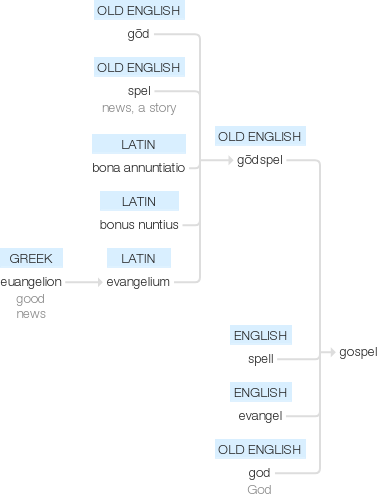Gospel
Old English gōdspel, from gōd ‘good’ + spel ‘news, a story’ (see spell2), translating ecclesiastical Latin bona annuntiatio or bonus nuntius, used to gloss ecclesiastical Latin evangelium, from Greek euangelion ‘good news’ (see evangel); after the vowel was shortened in Old English, the first syllable was mistaken for god ‘God’.
wiktionary
From Middle English gospel, gospell, godspel, godspell, goddspell, from Old English godspell(“gospel”), corresponding to good + spell(“talk, tale, story”), literally “the message of God”, believed to be an alteration of earlier *gōdspell(literally “good news”), used to translate ecclesiastical Latin bona annūntiātiō, itself a translation of Ecclesiastical Latin ēvangelium / Ancient Greek εὐαγγέλιον(euangélion, “evangel”, literally “good news”) (English evangel). Compare Old Saxon godspel, godspell(“gospel”), Old High German gotspel(“gospel”), Icelandic guðspjall(“gospel”).
etymonline
gospel (n.)
Old English godspel "glad tidings announced by Jesus; one of the four gospels," literally "good spell," from god "good" (see good (adj.)) + spel "story, message" (see spell (n.1)). A translation of Latin bona adnuntiatio, itself a translation of Greek euangelion "reward for bringing good news" (see evangel). The first element of the Old English word originally had a long "o," but it shifted under mistaken association with God, as if "God-story" (i.e. the history of Christ).
The mistake was very natural, as the resulting sense was much more obviously appropriate than that of 'good tidings' for a word which was chiefly known as the name of a sacred book or of a portion of the liturgy. [OED]
The word passed early from English to continental Germanic languages in forms that clearly indicate the first element had shifted to "God," such as Old Saxon godspell, Old High German gotspell, Old Norse goðspiall. Used of anything as true as the Gospel from mid-13c.; as "any doctrine maintained as of exclusive importance" from 1650s. As an adjective from 1640s. Gospel music is by 1955. Gospel-gossip was Addison's word ("Spectator," 1711) for "one who is always talking of sermons, texts, etc."
